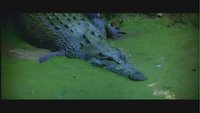
Our good friend Edward Copeland has spent considerable energy building on his website a compendium of unfavorable reviews of The New World with lots of links to Terrence Malick's naysayers. I admit I find odd and a little curious the prosecutorial glee with which he marshals attacks on a movie he has no intention of seeing. It's one thing to want to tear down the accolades automatically given to the latest contrivance from the Coen Brothers, but Terrence Malick? I thought his critical reception had always been mixed at best, I never guessed his movies made much money, and the last I checked, Rotten Tomatoes had The New World's fresh rating at a mere 55%.
On the flip side, Matt Zoller Seitz has written about the film with eloquence, passion, and an almost missionary zeal at The House Next Door. His praise and enthusiasm for the film feels infectious, if a tad hyperbolic at times. And I don't know what to make of such talk of "new cinematic languages" or "watershed cultural moments" and the like.
It was with these dueling opinions in mind, that my brother and I geared up for our journey to The New World last Sunday. During the smoke'em-if-you-got'em moments before the movie started we discussed as we have many times The Thin Red Line. My brother thinks it an absolute masterpiece, and I deeply admire large portions of it, but want to reign in a little, due to an overall disjointedness and what I felt at the end was either some clumsiness or a deliberate but needless and obfuscating ambiguity. But mostly when we talk of TTRL we talk about the way a match lights up the darkness, or how we first hear a diesel engine throb and then see a patrol boat through the trees cruising along the shore, or the way the brig really feels encased in thick steel deep within the ship's bowels.
"Terrence Malick knows how to film water", one of us will say, or "Terrence Malick knows how to film shoreline... how to film trees".
"Malick knows how to make the interior of a ship hum."
And then always there's the photography. To say that a Terrence Malick film looks good is an injustice. It's quite simply the best cinematography there is.
As we were walking through the multiplex, one of us noticed that we were both dressed a bit nicer than casual for some reason. "Gee, I do kind of feel like I'm going to church here."
"I think you'll like the service", I said.
"But will I like the people?" he replied. We went in and sat down.
And now that I've seen it, all I can say is: Wow, was Matt Seitz ever right and Ed Copeland wrong! It's a great big magnificent cathedral of a movie. It's an excavation, a digging down and a clearing away, it's a cleansing return to our creationist mythology. It's less a movie in any traditional sense, and more an object presented for meditation.
It's all here, of course, all that stuff that Malick's detractors find so worthy of mockery: the symphonic snippets of colloquial narration, the slow lyrical pacing, the hippie-trippy cutaways to trees, water, rocks, and birds. But I'm beginning to think this kind of ridicule is getting cheap and too easy. Here, let me try it:
Terrence Malick is one of the greatest filmers of nature ever. Like some japanese master, like an Inigaki, his nature inserts flow and pervade. What is background in other movies Malick puts front and center. Malick is the man to film Typee. And Omoo. And The Encantadas. Or all of Melville while he's at it. Or anything with a boat- or water- or trees- or a river.
I struggle to find other films to compare to The New World. Maybe Kurosawa's great film Dersu Uzala or Agnes Varda's Le Bonheur. I understand likening it to 2001: A Space Odyssey but Kubrick yanks our chain and dicks the audience around a bit ( shaggy God story and all of that.) There is none of that here. We are never lost in The New World, everything is up front, we feel we know exactly what it all means.
Perhaps it's easiest to describe it in terms and ideas borne out of Malick's previous work, especially the film it most resembles, The Thin Red Line. If you take the AWOL sections of that film, with James Caviezel roaming around and taking the jungle and islanders all in with those big, soulful, world-reflecting eyes ( I pegged him as an actor to play Jesus back in '98), add to it some stuff like the Ben Chaplin character's totemic sexual recollections of his wife, and mix it all with Malick's camera looking at everything like it has some sort of special Buddha lens attached to it, then we might approximate the movie we have here.
Now I can't honestly say I've ever really cried much at the movies, ( and as an insurance policy I never watch anything where something horrible befalls a child, as I know I can't handle it) but somewhere during the last reel of this one, what with that Wagner music swelling, and the wind gusts blowing in ( you can almost smell the salt) and Pocahontas chasing after her little son across the lawns and along the hedges, and that hide-and-seek camerawork, it all got to working on me and I welled up and sat misty-eyed right through to the end, with its final shot so perfect and apt and unmistakably clear in its poetry.
The New World bore through me in an emotional way that few films have. I think it reaches the summit of film art. And it will take its place there, and join in my moviegoer's heart with other films cherished for the humbled awe I feel when witnessing something de profundis. With the bottom-dropped-out heartache I felt watching two condemned men reach for each other's hands instinctively as they walked to their execution in Breaker Morant, with the gratitude that I owe F.W. Murnau for providing Sunrise with a happy ending, with the dumbfounded, quivering mass of mixed emotions that I turn into if I even start thinking about Rossellini's great masterpiece Paisan.
The human story here is affecting, but I don't think that's what got to me. It's something else. It's not like, say, some italian neorealist film, whereupon leaving we rejoice and want to shout across the rooftops " Now That's Humanism!" No, it's something else, something profound and metaphysical. Something Zen like, and to do with the individual's relation to reality. Throughout this movie we always feel the weight of future generations, and in our mind's eye we superimpose the country and people we know today onto the tracts of wilderness.
To conclude, I'll just have to say thank you Matt Seitz, for your evangelism. The church service was exceptional and the people good. And Mr. Copeland, I urge you to attend this movie. You may indeed find it boring and not like it, in which case we'll examine your head in Part Two. Here I'll end with the only words my brother and I could muster as we left the theater and made the long walk to the car, the only words, that is, until we got home and started bouncing around saying how fucking awesome it was.
" Terrence Malick knows how to make an old ship creak."
" Hell, man, Malick knows how to make a creek creak."
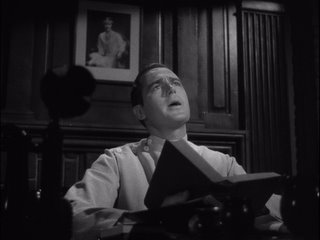
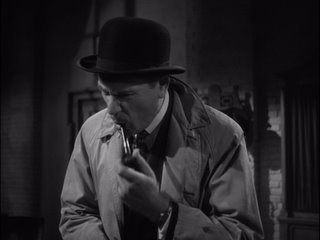
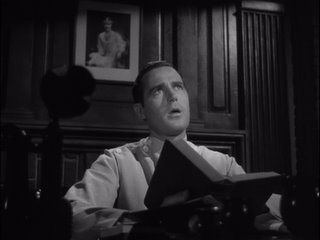
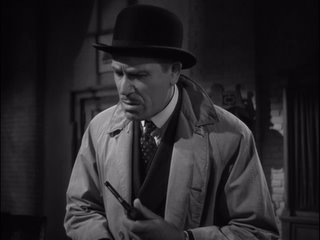
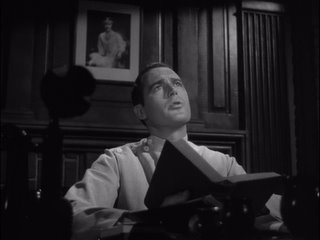
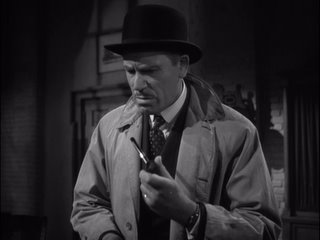
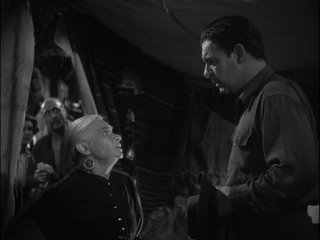
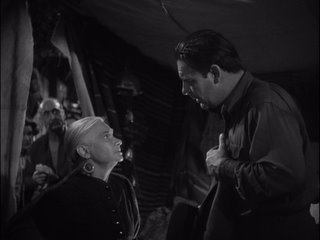
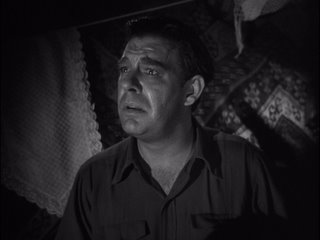
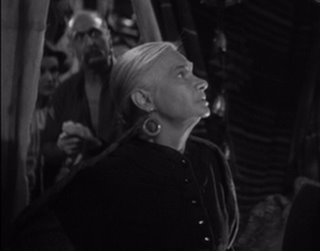
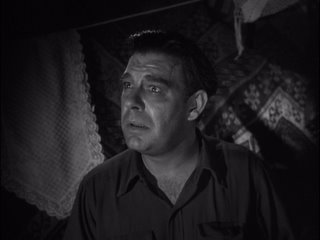
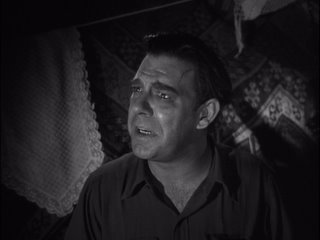

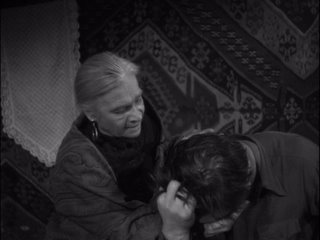
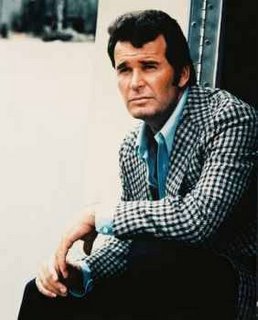


 Kharis sure as hell does.
Kharis sure as hell does.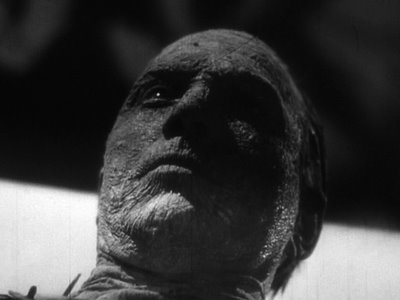 He spent a good chunk of the last century trying to hunt them down, first in Maplewood, USA and then later, in the Hammer films, at some posh neighborhood in England located conveniently near an insane asylum. I’m not sure where in England, exactly. It’s sort’ve like the village near Frankenstein’s castle – where was that exactly? The old ladies were English, the burgomaster was Prussian and the torch wielding mob, judging by their use of fire, must have been French. Viva la monster’s death!
He spent a good chunk of the last century trying to hunt them down, first in Maplewood, USA and then later, in the Hammer films, at some posh neighborhood in England located conveniently near an insane asylum. I’m not sure where in England, exactly. It’s sort’ve like the village near Frankenstein’s castle – where was that exactly? The old ladies were English, the burgomaster was Prussian and the torch wielding mob, judging by their use of fire, must have been French. Viva la monster’s death!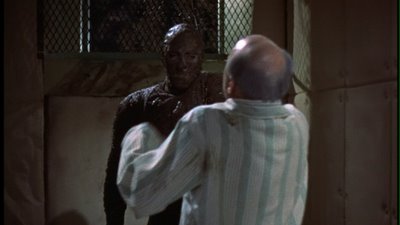 How did Kharis get to England? His handler....
How did Kharis get to England? His handler.... 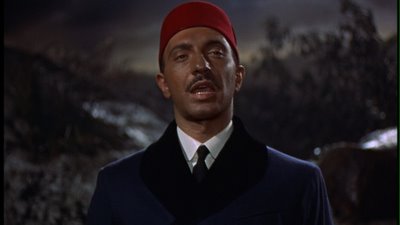 ...a sith like priest in the miniscule cult of Ananka, brought him in a casket marked “relics, just some old relics…nothing more.” He moved in to John’s neighborhood. And John Banning took a little time piecing it all together (a rare case of the deniability factor for Mr. Cushing, in fact, the only one I can think of if you don’t count Star Wars), but by the time the second murder happened – to another party of the expedition, he figured it out.
...a sith like priest in the miniscule cult of Ananka, brought him in a casket marked “relics, just some old relics…nothing more.” He moved in to John’s neighborhood. And John Banning took a little time piecing it all together (a rare case of the deniability factor for Mr. Cushing, in fact, the only one I can think of if you don’t count Star Wars), but by the time the second murder happened – to another party of the expedition, he figured it out. 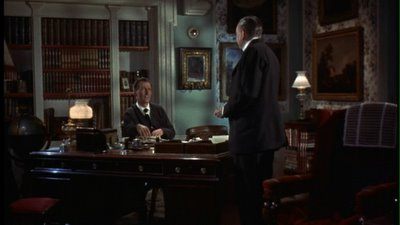



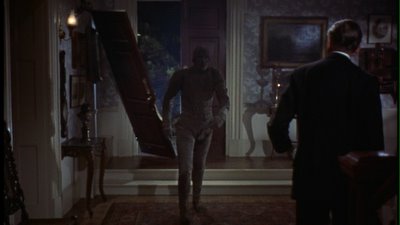
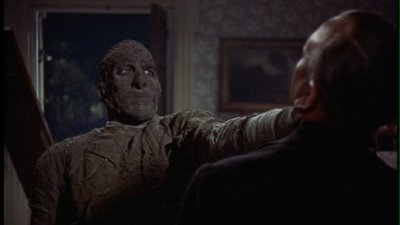 Notice how quickly Kharis gets from point A to point B. Like a man with a purpose. The Universal Kharis was often laughably slow. Not the Hammer mummy. Christopher Lee lumbers onward, straight to his prey. But he cannot multitask – and though the next night’s victim is there in the room, Kharis returns to his master. John fires his pistol….
Notice how quickly Kharis gets from point A to point B. Like a man with a purpose. The Universal Kharis was often laughably slow. Not the Hammer mummy. Christopher Lee lumbers onward, straight to his prey. But he cannot multitask – and though the next night’s victim is there in the room, Kharis returns to his master. John fires his pistol….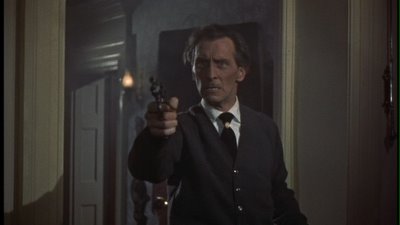 But the monster still moves?
But the monster still moves?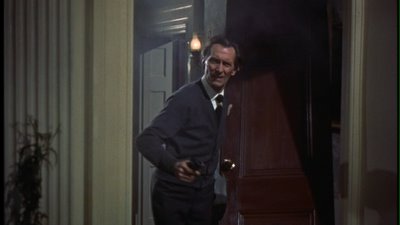 Peter Cushing is a master of props. In fact, one of his nicknames was Peter Props. He could fiddle with something or smoke a cigarette in a manner that seemed effortless and natural. He doesn’t come off as too self aware as most of the later method actors do. Personally, I like my Peter Cushing in a Victorian study with a glass of brandy and a gun cabinet. Which is why I like The Mummy.
Peter Cushing is a master of props. In fact, one of his nicknames was Peter Props. He could fiddle with something or smoke a cigarette in a manner that seemed effortless and natural. He doesn’t come off as too self aware as most of the later method actors do. Personally, I like my Peter Cushing in a Victorian study with a glass of brandy and a gun cabinet. Which is why I like The Mummy.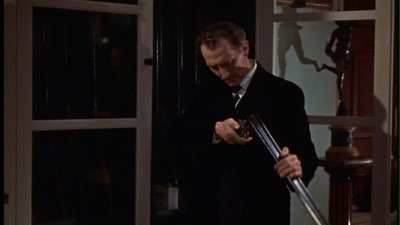 In most horror or sci-fi films, the bad guy or creature starts off in the film as being completely invulnerable and often excessively powerful. But two hours of a bad movie can drain the energy from anything and towards the end, the hero faces a drastically weakened creature, though presumably nothing has changed. The result is that the finale is often something that wasn’t remotely plausible at the beginning of the picture. That doesn’t happen in The Mummy. Kharis busts through the french doors of John Bannings study as quickly as he tore open the bars of his dad’s cell, and broke down the front door to get that other guy. Kharis is still quite unstoppable. But, when its John’s turn to die, he keeps his cool and does everything in his power to slow Kharis down – perhaps the fractions of a second will allow an opportunity to present itself.
In most horror or sci-fi films, the bad guy or creature starts off in the film as being completely invulnerable and often excessively powerful. But two hours of a bad movie can drain the energy from anything and towards the end, the hero faces a drastically weakened creature, though presumably nothing has changed. The result is that the finale is often something that wasn’t remotely plausible at the beginning of the picture. That doesn’t happen in The Mummy. Kharis busts through the french doors of John Bannings study as quickly as he tore open the bars of his dad’s cell, and broke down the front door to get that other guy. Kharis is still quite unstoppable. But, when its John’s turn to die, he keeps his cool and does everything in his power to slow Kharis down – perhaps the fractions of a second will allow an opportunity to present itself.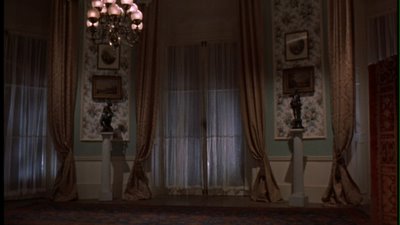
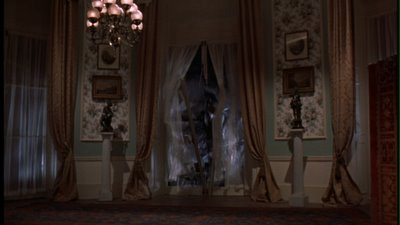
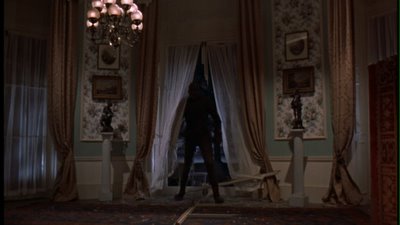
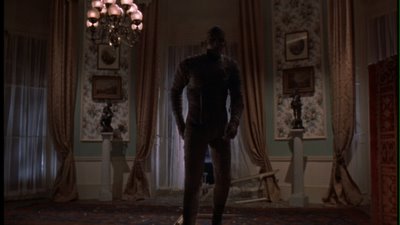 First, he blasts him twice with the shotgun
First, he blasts him twice with the shotgun 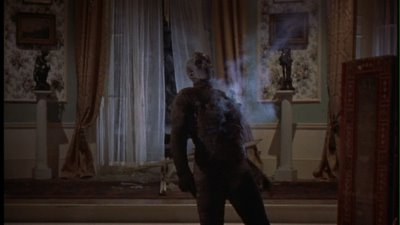
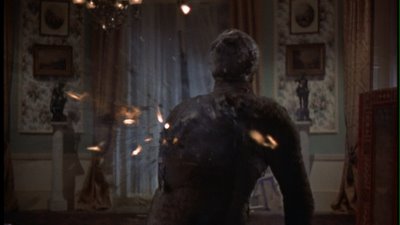 Kharis is still unstoppable - forcing John to strategically redeploy over his desk.
Kharis is still unstoppable - forcing John to strategically redeploy over his desk. 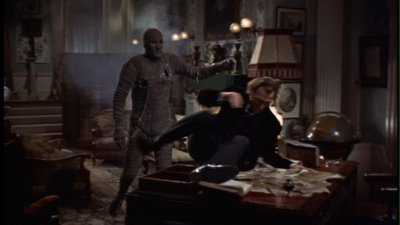
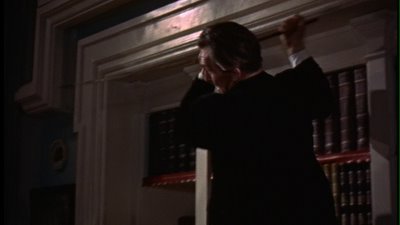
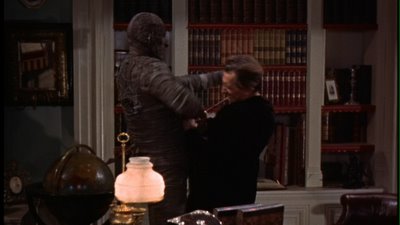 Yet, the bastard mummy is still unstoppable.
Yet, the bastard mummy is still unstoppable.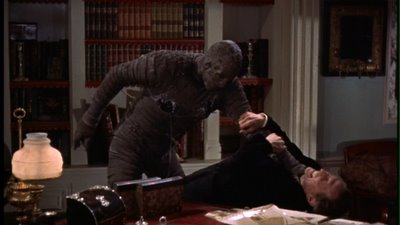 Until the opportunity stumbles in.
Until the opportunity stumbles in.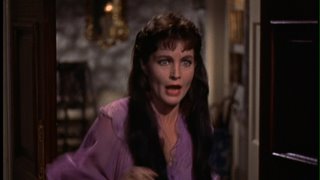
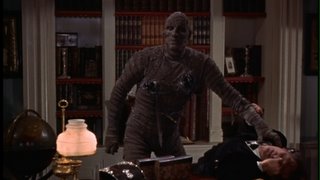
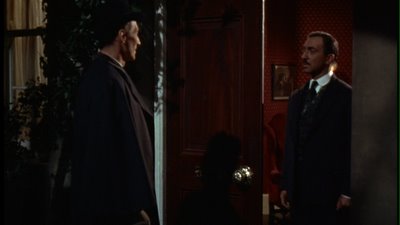 and craps on his religion instead – in a gentlemanly way, of course.
and craps on his religion instead – in a gentlemanly way, of course.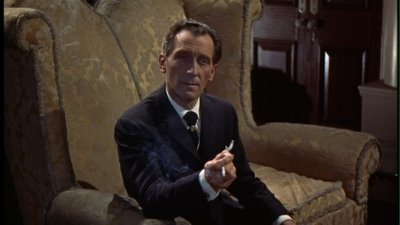 Which sets up a finale with more of this:
Which sets up a finale with more of this: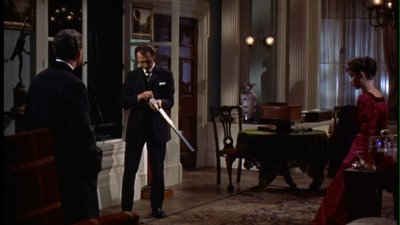 And more of this:
And more of this: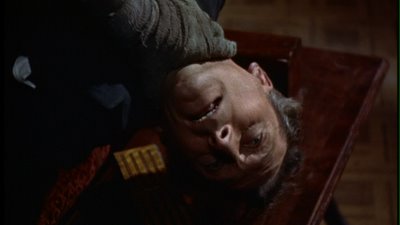 And this:
And this: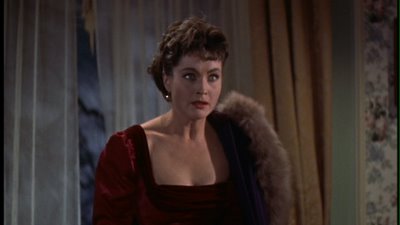 The film has several weak spots in the script, but because of Terence Fisher's direction and the cast, particularly Peter Cushing, it weathers past those and is thoroughly entertaining.
The film has several weak spots in the script, but because of Terence Fisher's direction and the cast, particularly Peter Cushing, it weathers past those and is thoroughly entertaining. 

 Notice the calm in the Doctor/Baron’s demeanor. He has no intention of sharing their breakthrough with others. His purpose from the get-go was to create a man, as cursed and damned as you ever saw. His partner is horrified and refuses to take part, but that doesn’t stop the Doctor/Baron from proceeding, getting parts by hook or crook or sometimes……murder.
Notice the calm in the Doctor/Baron’s demeanor. He has no intention of sharing their breakthrough with others. His purpose from the get-go was to create a man, as cursed and damned as you ever saw. His partner is horrified and refuses to take part, but that doesn’t stop the Doctor/Baron from proceeding, getting parts by hook or crook or sometimes……murder. 

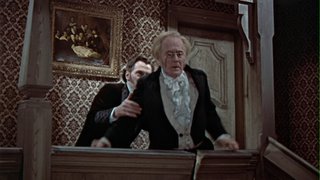

 He was going after that fella’s brain – which brings up a curious oversight. If you were after the professor’s noodle, then why kill him in a way that would smash the skull? Nevertheless, Peter Cushing plays the coldest most ruthless Frankenstein ever. He never frets about what he is doing or what he has done – but he’s always thinking about how to move forward.
He was going after that fella’s brain – which brings up a curious oversight. If you were after the professor’s noodle, then why kill him in a way that would smash the skull? Nevertheless, Peter Cushing plays the coldest most ruthless Frankenstein ever. He never frets about what he is doing or what he has done – but he’s always thinking about how to move forward. 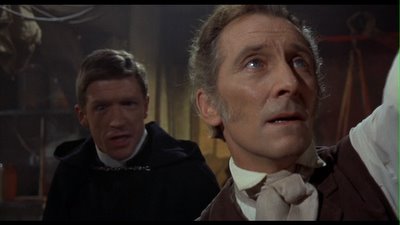 Notice how the local religious authority is outraged and confronting the doctor, yet the doctor is too busy with his work to pay him any mind.
Notice how the local religious authority is outraged and confronting the doctor, yet the doctor is too busy with his work to pay him any mind. 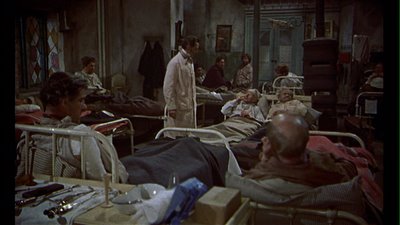 Even when he creates a hospital for the poor in Revenge of Frankenstein, his purpose remains singular – to create another man. The destitute patients merely provide a front for his nefarious activities, as well as a 24 hour pull-o-part.
Even when he creates a hospital for the poor in Revenge of Frankenstein, his purpose remains singular – to create another man. The destitute patients merely provide a front for his nefarious activities, as well as a 24 hour pull-o-part.


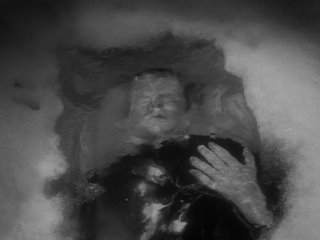
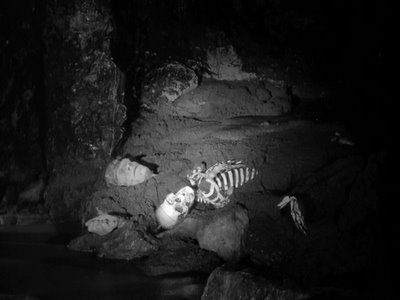

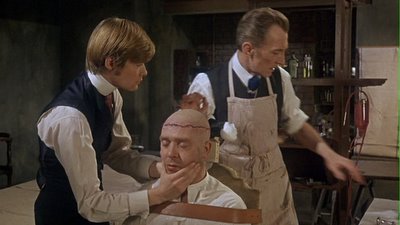
 What a ride!
What a ride!

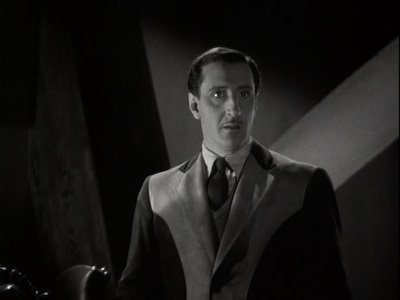
 In true Universal fashion, the monster is like a re-heatable snack, recovered, yet again, from the ice. Tupperware is still trying to find the Doctor’s secret. (Incidentally, The Evil of Frankenstein may not be held in high esteem, but there's an excellent sequence when the Doctor/Baron recounts when he first created the monster.)
In true Universal fashion, the monster is like a re-heatable snack, recovered, yet again, from the ice. Tupperware is still trying to find the Doctor’s secret. (Incidentally, The Evil of Frankenstein may not be held in high esteem, but there's an excellent sequence when the Doctor/Baron recounts when he first created the monster.)







.jpg)





